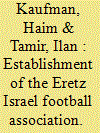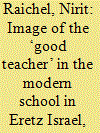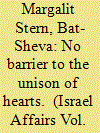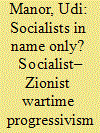| Srl | Item |
| 1 |
ID:
172148


|
|
|
|
|
| Summary/Abstract |
The Eretz Israel Football Association was established on 14 August 1928 and became an official member of FIFA in May, 1929. The establishment of the Association culminated an extended process including efforts extending throughout the 1920s to institutionalise football in Eretz Israel. This article describes these efforts and the phases of institutionalising football in Eretz Israel in the 1920s; the contribution of the Russians, British, French, and Egyptians; and the rivalry between Hapoel and Maccabi, all of which ultimately contributed to the establishment of the Israel Football Association (IFA).
|
|
|
|
|
|
|
|
|
|
|
|
|
|
|
|
| 2 |
ID:
183994


|
|
|
|
|
| Summary/Abstract |
This article discusses the image of the ‘good Hebrew teacher’ as perceived by the leading Hebrew teachers in Eretz Israel. The discourse, which began with the establishment of modern schools, developed in professional meetings of the leading Hebrew teachers and was reflected in teachers’ articles in the press and the professional journal Hahinuch, where they discussed the characteristics of the teacher’s personality and knowledge and of the teacher as a professional. Along with this profile, the article presents the educational work performed to realise it.
|
|
|
|
|
|
|
|
|
|
|
|
|
|
|
|
| 3 |
ID:
160298


|
|
|
|
|
| Summary/Abstract |
A coalition of women from all walks of life was common in women’s activism at the beginning of the twentieth century. The recognition of the importance of the empowerment of women through autonomous, public activity was also shared among the women’s organisations that decided to cooperate in the political arena in Eretz Israel. Their collaboration indicates the importance they attached to the commitment to united action that was based on the acceptance of Zionist principles, on the one hand, and their aspiration to overcome what separated them, on the other. The women’s coalition overcame geographical distance and differences in class or political and social orientation, while challenging the old consensus and the boundaries of exclusion and inclusion prevailing in Zionist society. This article focuses on the collaboration between women’s organisations of labour Zionism and middle-class Zionism of various national affiliations, thus forming a transnational coalition in the build-up to statehood. Their claims, activities and modes of operation in the fields of politics and economics are analysed alongside the results and the effect of their efforts.
|
|
|
|
|
|
|
|
|
|
|
|
|
|
|
|
| 4 |
ID:
165292


|
|
|
|
|
| Summary/Abstract |
The main challenge for all sorts of progressivism – socialism included – has been to find the right balance between individual rights, group rights and humanity, and from the nineteenth century onwards, nationalism became the preferred road to attain this balance. Labour Zionism, as part and parcel of progressive Zionism, strove from its early days to achieve these goals, enjoying support from West European socialists holding the same progressive convictions. The main obstacle confronted by early Zionist socialists and their non-Jewish partners in their quest for a better world was not the alleged contradictions between universalism, nationalism and individualism, but the enduring tendency to reject the Jewish right for national self-determination. This undying predisposition, prevalent in the first half of the twentieth century among political elites (Arab and otherwise), is still alive in academic circles.
|
|
|
|
|
|
|
|
|
|
|
|
|
|
|
|